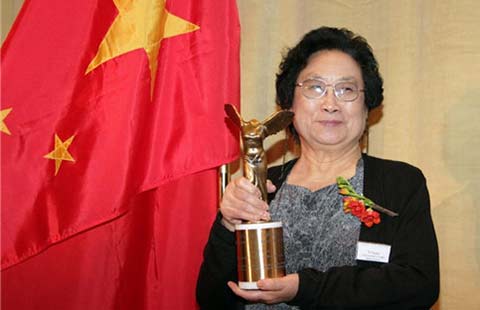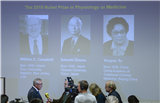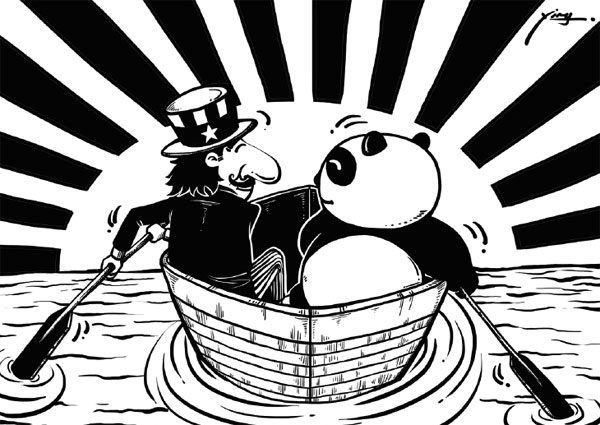Mutual respect key to greater cooperation
Updated: 2015-10-08 07:47
(China Daily USA)
|
||||||||
Economic future bright
After the Purchase Manager Index, seen as a barometer of the economy, fell to 47 in September for the first time this year and other disappointing data, aroused widespread speculation about a "hard landing" for China's economy, many worried that China's slowdown might have a negative effect worldwide.
But President Xi Jinping eased the world's concerns about China's economy during his US visit, emphasizing China is undergoing economic restructuring and transformation, which might be a painful process but promises a brighter future.
China's relatively lower GDP growth rate compared with the past high-speed years, comes at a time when global economic growth has slowed and is in accordance with the global economic cycle.
Moreover, many technological breakthroughs have been achieved that will boost quality growth with innovation. In 2014, the State Intellectual Office accepted 928,000 patent applications, 12.5 percent higher than the previous year. In fact, the number of Chinese patents has been the most in the world for four successive years, implying a new cycle of prosperity.
The worry about China's monetary policies having a negative effect is even more unnecessary. The US Federal Reserve is globally influential because 60 percent of US dollars circulate overseas; by increasing or cutting interest rates, the Federal Reserve can easily inject inflation or deflation into emerging economies. China is pursuing the internationalization of the renminbi, but its currency is not so influential.
Dong Xiaojun is a professor on financial strategy at the Central Party School.
Boost to growth potential
During his just-concluded visit to the US, Chinese President Xi Jinping promised solemnly that China will never close its doors to global investors and businesses.
Opening up has been China's policy ever since the reform in 1978. It includes three principles that benefit both China and the world: China will use the foreign investment, protect investors' legal rights and provide better, more convenient services to them.
It was an open door that supported China's economic development for the past 36 years and made it the second largest economy of the world. The opening-up policy not only allowed Chinese economy to embrace that of the world, but also granted it an innovative mind to reform the outdate bureaucracies to release the potential of growth.
Currently, facing the slowdown and other problems with its economy, China needs more efforts to pass the tests of economic restructuring and transformation. That requires it to cling to the opening-up policy and show a more positive and confident gesture toward the world.
Weeks ago, in a jointly released official document, the Communist Party of China Central Committee and the State Council clearly said that opening-up is China's fundamental policy. In the coming years, China will further boost its potentials of growth and benefit the world with dividends.
Chen Fengying is a senior researcher on economics at China Institutes of Contemporary International Relations
Cyberspace deal crucial
During President Xi Jinping's visit to the US, through deep, sincere and constructive talks with US President Barack Obama, the two leaders have achieved consensus on a variety of issues, of which cyberspace is an essential one. The visit and the negotiations achieved will open a new horizon for the two nations to strengthen cooperation in the cyberspace.
Their consensus will, first of all, lay a sound basis on global cyberspace governance. The key debate over cyberspace governance lies on how to draft rules that meet the demands of various sides, with the focus being intellectual property rights protection and crimes in the cyberspace. They reached a "common understanding" on steps to curb cyber spying, agreed that neither government would conduct nor support economic espionage in cyberspace, and promised to enhance efforts in combating cybercrime and sharing related information. These lay a solid basis for the forming of international rules in the cyberspace.
More importantly, the consensus makes it possible for the two countries to eliminate misunderstanding on cyberspace, like sources of hacking. China has always been a victim of hacking and a strong defender of cybersecurity, yet the US often blames it for attacks whose sources cannot be tracked. The two leaders have made clear that both should react to the other's request of help in time according to their own laws and international obligations, and agreed to open a hotline on the issue.
Just like President Xi said, Sino-US cooperation benefits both while their quarrel hurts the interests of both. That applies in the cyberspace as well and their consensus on the issue is key to promoting cooperation.
Wang Chuang is a researcher in cybersecurity at CCID Think Tank, affiliated to the Ministry of Industry and Information Technology.
Bilateral ties improving
President Xi Jinping's fruitful visit to the United States will serve as a robust boost for the realization of a new model for relations between major countries, a key concept put forward by Xi to promote ties between China and the US two years ago.
For starters, the pragmatic cooperation and mutual trust between the two nations have reached a new height, given the 49 agreements that were reached during the summit between Xi and his US counterpart Barack Obama on Sept 25, which cover a variety of areas such as investment, people-to-people exchanges, climate change and coordination in multilateral affairs.
In these agreements,China showed full respect to the US' interests and influence in Asia,while the US in return welcomed more Chinese enterprises-including State-owned ones which have so far struggled to enter the US market to invest in the country and enjoy the favorable policies enjoyed by other foreign investors.
Besides, both governments agreed to apply the principles of non-conflict, non-confrontation, and mutual respect in addressing some sensitive matters, for example, the cyber security clashes which at one point put the two countries on the brink of launching sanctions. And both countries are now expected to take measures to promote cooperation on mutually identified corruption cases, a big leap for China's ongoing anti-graft campaign.
Admittedly, some US politicians are still reluctant to give credit to the China-proposed new model for major country relations, but the improving bilateral interaction proves that both countries have reached a consensus on preventing their disparities from dragging them into a global confrontation.
Huang Renwei is deputy director of the Shanghai Academy of Social Sciences.
Essence of the Chinese Dream
The Chinese Dream, as President Xi Jinping stressed in a written interview with the Wall Street Journal ahead of his first visit to the United States, does have a lot in common with the American Dream in terms of the individual pursuit of peace, development, and innovation. It is no doubt that people from both nations want to live a better life.
But likening one to the other in the national level, would be ill-considered even dangerous, because they are essentially different. Although known for entrepreneurial spirit and innovative mindset, the American Dream has also shown its dark side during the past decades. Bypassing the United Nations and waging more than one regional wars, Washington has sought to impose its own will on other countries, including Iraq and Afghanistan, in the hope that the so-called Western democracy would bear fruit.
In contrast, being a staunch defender of global peace and stability, Beijing adopts a very different approach in realizing its dream. China's participation in 600 new projects that aim to help developing countries on trade, poverty reduction, as Xi announced at the UN summits, is a proper example.
As a means of "achieving national prosperity, rejuvenation and happiness for the Chinese people", the Chinese Dream should play a big role in fulfilling the "World Dream", which must not be built on wars, clashes, and hegemony. Of course, it calls for positive interactions between China and other countries, the US included, to safeguard and optimize the global order.
Gao Zhikai is director of China National Association of International Studies.
Peaceful development
Safeguarding the world peace and opening its door to other nations still top China's pursuit of peaceful development. As amain contributor, participator, and beneficiary of the post-World War II order, China will neither seek hegemony nor pose a threat to the regional security, despite its notable rise in recent years.
Founded on the principles of UN Charter, the postwar world order is far from flawless and has received a number of complaints from developing economies, which are often marginalized by the traditional advanced ones in the West. The world body, too, should have played a more significant and efficient role in defusing regional tensions and guiding the development of some poverty-stricken areas.
In effect, what Beijing aims to promote is a benign multi-polarization in the system, which can allow the less developed nations to have a bigger say in global and regional affairs. Challenging Washington's global leadership and the current global order is never an option. The controllable strategic competition between the two nations is not a zero-sum game either.
China's concrete contributions to the betterment of the global order, such as the launch of the Asian Infrastructure Investment Bank, speak louder volumes than any pointless argument. It has agreed to increase its financial contributions to the World Bank and other global financial institutions, after initiating 600 new projects ranging from poverty-reduction to climate change. Such efforts epitomize the country's commitment to peaceful development.
Jia Xiudong is a senior research fellow from the China Institute of International Studies.
More interactions needed
For many US citizens, China is still a mysterious oriental country which sells a lot of cheap products to their country. In general, they hold little grudge against the country except for its low-quality exports flooding their supermarkets. At bottom, it is just the few China watchers, journalists, and politicians who see China as a grave threat to the US.
Quite interestingly, Chinese people, especially the younger generations, knows a lot about what is going on in the US, not the other way around. It thus requires them to make more efficient self-introductions to their US peers. Grassroots or unofficial exchanges can be a feasible solution.
Before Xi concluded his maiden state visit to the US, both sides agreed to support the holding of the China-US Young Maker Competition annually, as well as the collaboration between the think-tanks in Chinese and US universities, marking a promising start.
Teenagers, in particular, should pursue a knowledge-driven approach in a bid to acquire a comprehensive understanding of the other country. On the other hand, think tank scholars also need to keep an open mind to their foreign counterparts and engage in more in-depth, constructive discussions, regardless of their nationalities and which government they represent.
Likewise, the "state-province collaboration" between Chinese provinces and US states, is expected to become another new break-through in the bilateral relationship, because it involves little ideological differences and focus on economic cooperation and common interests.
Zhao Kejin is an associate professor of international relations at Tsinghua University.
|
Wang Xiaoying / China Daily |
(China Daily USA 10/08/2015 page12)
- Robot monk with artificial intelligence makes debut
- Nursing homes, more Chinese old people's final choices
- Hit-and-run luxury car driver detained in Beijing
- Park officials say glass cracks don't affect walkway's safety
- China becomes smaller for tourists
- Scenic spots packed with tourists on National Day Holiday
- Russian warplanes hit IS targets in Syria
- Senior US envoy to visit Japan, S Korea, China
- Russia, US agree to cooperate in solving Syria crisis: Russian FM
- Iranian President calls Iran deal victory over war
- LatAm experts praise Xi on yuan, globalization
- Evidence found of summertime water flows on Mars: study

 News you don't wanna miss over the National Day holiday
News you don't wanna miss over the National Day holiday
 TCM knacks to fight post-holiday syndrome
TCM knacks to fight post-holiday syndrome
 Zhang Lei wins fourth season of Voice of China
Zhang Lei wins fourth season of Voice of China
 Travel rush around China as National Day holidays end
Travel rush around China as National Day holidays end-
 Rising yuan use may lift IMF basket prospects
Rising yuan use may lift IMF basket prospects 
 China wins first Nobel in medicine
China wins first Nobel in medicine-
 Gary Locke: Candor key to relations
Gary Locke: Candor key to relations -
 Saving Chinese folk songs
Saving Chinese folk songs
Most Viewed
Editor's Picks

|

|

|

|

|

|
Today's Top News
Tu first Chinese to win Nobel Prize in Medicine
Huntsman says Sino-US relationship needs common goals
Xi pledges $2 billion to help developing countries
Young people from US look forward to Xi's state visit: Survey
US to accept more refugees than planned
Li calls on State-owned firms to tap more global markets
Apple's iOS App Store suffers first major attack
Japan enacts new security laws to overturn postwar pacifism
US Weekly

|

|






